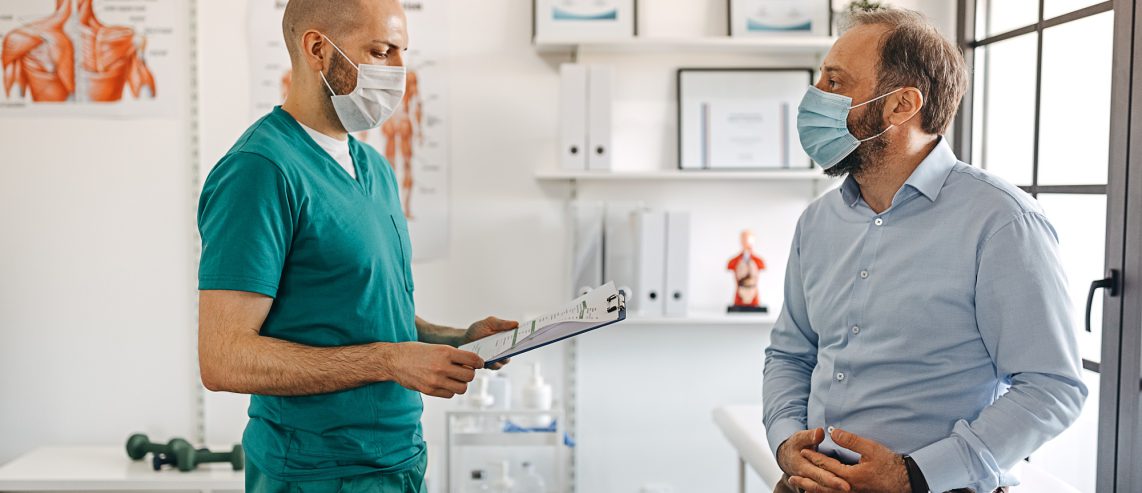Shashi Kumar, MD, a gastroenterologist at West Mifflin Gastroenterology-UPMC, knows all the reasons why people don’t want to get a colonoscopy.
“They say the prep has an unpleasant taste and makes them nauseous. They don’t have symptoms and feel just fine. And it’s a hassle to take time off work,” he says. “But regular colonoscopies are the single best tool we have to prevent the most colorectal cancers and save lives.”
In the United States, colorectal cancer is the third most commonly diagnosed cancer and the third leading cause of cancer-related deaths among men and women. The American Cancer Society estimates there will be 150,000 new cases of colon cancer diagnosed this year — and 53,000 deaths.
Dr. Kumar, who is board-certified in gastroenterology and internal medicine, is a well-established medical practitioner in Pittsburgh’s South Hills. At West Mifflin Gastroenterology-UPMC, he diagnoses and treats a wide array of gastrointestinal disorders and diseases, including colorectal cancers.
Never Miss a Beat!
Subscribe to Our HealthBeat Newsletter!
Thank you for subscribing!
You can now select the specific newsletters you'd like to receive.
You are already subscribed.
Subscribe to more newsletters in our email preference center.
Sorry, an error occurred. Please try again later.
Get Healthy Tips Sent to Your Phone!
His new offices are in the UPMC Outpatient Center at 1907 Lebanon Church Road in West Mifflin (near Target). For an appointment, call 412-653-8548.
We asked Dr. Kumar to talk about colorectal cancer and why doctors now recommend starting colonoscopy screenings for patients at age 45 — even if they have no symptoms. Here’s what he had to say.
What are the symptoms of colorectal cancer?
Rectal bleeding is the most common symptom. And rectal bleeding in anyone who hasn’t had a colonoscopy — regardless of their age — is a bad sign. Unfortunately, young people tend to write off rectal bleeding as ‘just hemorrhoids’. That’s often not the case, which is why I encourage primary care doctors to screen those patients for colorectal cancer.
Early cases of colorectal cancer can begin as noncancerous polyps inside the colon. Over a period of time, those polyps can become cancerous. The goal of colonoscopy is to find and remove them before that happens.
Why do doctors recommend regular colonoscopy screenings?
There usually are no symptoms in the early stages of colorectal cancer. That’s why many people think they don’t need a colonoscopy. But it’s the most powerful tool we have to prevent colorectal cancer.
Removing polyps during colonoscopy can not only prevent colorectal cancer but also reduce deaths from the disease, according to a National Institutes of Health study. When caught early, the five-year survival rate is 90.9%. As of 2019, the NIH reported that nearly 1.5 million people in the United States were living with colorectal cancer.
Who’s most at risk for colorectal cancer?
While the risk of getting colorectal cancer increases as you get older, factors like family history, genetic syndromes, and poor lifestyle choices can put you at an increased risk.
Ethnicity can also be a risk factor. Among African Americans, the risk of colorectal cancer is 44% higher in men and 19% higher in women when compared to the general population. The rate of death also is higher in this demographic.
Has there been a rise in colorectal cancer cases among younger adults?
Colorectal cancer cases have doubled in people between the of ages 20 and 49, which is why the U.S. Preventive Services Task Force now recommends that people get their first colonoscopy screening at age 45 instead of age 50. If you have an immediate family history of colon cancer, screenings should start even sooner.
Colon cancer tends to be different in younger patients. It can be very aggressive and very advanced, with a higher rate of death. It’s possible this increase is related to lifestyle factors such as poor diet, being overweight and sedentary, and maybe smoking and alcohol consumption. We still don’t know exactly why this is happening, but it’s important to be diagnosed and treated as early as possible for the best outcomes.
We are also seeing higher mortality rates in patients between the ages of 45 and 50 who are diagnosed with colorectal cancer.
What’s your opinion of at-home test kits?
While they may offer an alternative route, colonoscopy remains the gold standard in screening for colon cancer. It’s a one-step screening test. That means we can detect and remove polyps during the same procedure. No alternative can replace a good colonoscopy done by a qualified and experienced gastroenterologist.
If you’re at average risk of colon cancer and you’re reluctant to get a colonoscopy, ask your doctor if an at-home test kit is an acceptable alternative for you. Any positive at-home test should be followed by a colonoscopy. You should also check with your insurance provider to discuss your policy’s coverage for colonoscopies and the home test kits.
Whatever your choice, I urge patients to commit to regular cancer screenings as recommended by your doctor for your age and family history. Your risk of getting colon cancer will be dramatically lower when you do.
Editor's Note: This article was originally published on , and was last reviewed on .
About UPMC Hillman Cancer Center
When you are facing cancer, you need the best care possible. UPMC Hillman Cancer Center provides world-class cancer care, from diagnosis to treatment, to help you in your cancer battle. We are the only comprehensive cancer center in our region, as designated by the National Cancer Institute. We have more than 70 locations throughout Pennsylvania, Ohio, and New York, with more than 200 oncologists – making it easier for you to find world-class care close to home. Our internationally renowned research team is striving to find new advances in prevention, detection, and treatment. Most of all, we are here for you. Our patient-first approach aims to provide you and your loved ones the care and support you need. To find a provider near you, visit our website.

